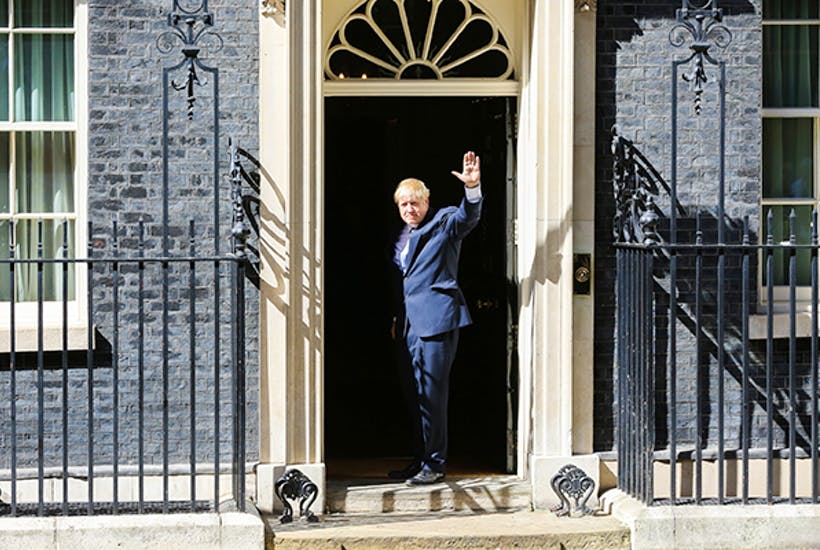It’s hard to think of a prime minister who has reached No. 10 with lower expectations. Boris Johnson has been dismissed as a philandering clown, a joker calamitously miscast as prime minister in a moment of national crisis. Obloquy has been hurled at him every time he has taken a new job — from mayor of London to foreign secretary. When he became editor of this magazine, his critics said putting The Spectator into the hands of such an oaf was like asking an ape to look after a Ming vase.
At every stage, however, Boris’s critics have been confounded. His jobs change, but his style remains. His belief is that achievements speak for themselves, and voters understand that. He has been happy to be judged on his time as London mayor and on the Vote Leave campaign. The road to success, he believes, is to find brilliant people and give them the freedom to achieve great things. This is what he did at The Spectator, and in City Hall — and it is what he will now do as prime minister.
He is fundamentally a meritocrat. Theresa May had a weakness for ministers who were hopelessly ineffective but loyal. Tony Blair and Gordon Brown both had their tribes: the Blairites and Brownites were chosen more for affiliation than ability. David Cameron’s government was known as a ‘chumocracy’ because he elevated his old Oxford friends. Westminster politics is a tribal game, so new PMs tend to arrive with their tribe.
There will be no Boris Johnson chumocracy, because he’s not clannish: he doesn’t really have many chums. For all of his flamboyance, he is a very private politician who has never felt the need to build a tribe.
This is no time for a conventional prime minister, and a majority of Tory MPs backed Boris because they understand this. The task, now, is to try to bring the country back together — and the new PM must seek to recover the broad political appeal which he seemed to possess as mayor of London.
This should be possible: he is, after all, fundamentally a liberal. The attacks on him are a sign of the unhinged nature of much of the Brexit debate: it is bizarre that he can be damned as a kind of extremist — a racist even. For determined Remainers, no one who campaigned for Brexit can ever be forgiven for precipitating what they view as a national disaster. Then there are the Brexiteers, who cannot view the political landscape without seeing a dark conspiracy to squash the will of the people.
Boris is not going to get the chance to get started on any programme of liberal reforms, of course, until he first solves the Brexit conundrum. To achieve that, he and his team will have to do a lot of brainstorming over the summer, as well as building relationships with European leaders.
Nothing is as hopeless as it first seems. As Martin Howe QC explains in this week’s issue, Boris is right to look towards a temporary solution while a more permanent trade deal with the EU can be negotiated. He is quite right to maintain a no-deal Brexit as his own backstop. As has become clear from a recent interview with Michel Barnier, Theresa May did not once threaten a no-deal outcome or give the EU the impression that she was serious about walking away from negotiations if a good deal could not be reached. It was the fatal flaw in her approach.
There has been a small flurry of resignations from ministers who wish to avoid a no-deal Brexit at all costs. Any two MPs could precipitate the collapse of Boris Johnson’s government, were they minded to take down the ship and themselves with it. What is not on the side of the rebels is timing. For those intent on stopping hard Brexit, or Brexit altogether, there really is only one opportunity to bring a confidence vote — in the first week of September, before the conference season begins. Leave it any later, and they risk Britain dropping out of the EU while parliament is prorogued for a general election campaign.
Boris has more breathing space than might be supposed, therefore. If he can use his time well and avert a September confidence vote, there is every chance that a satisfactory exit from the EU might be achieved by 31 October. If not, and we leave without a deal, the Johnson government will have another huge challenge on its hands: how to avert large-scale economic damage.
Either way, if Boris can survive his first three months in office, his position will be stronger. If he achieves a deal with the EU by 31 October, he will be unassailable — and his critics within the party humbled. That will be the time to unveil his reform programme. For all the invective that Johnson now seems to inspire among his enemies, there is no reason to assume that he will not be capable of going to the country at that point and winning his own mandate.






Comments